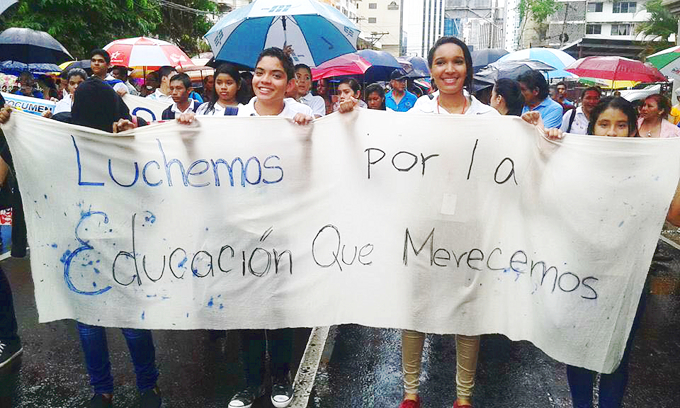
A decade after a major defeat, the teachers’ unions win big
by Eric Jackson
After a six-hour July 23 negotiating session between a special government committee and representatives of the nation’s teacher unions, an agreement granting an across-the-board $300 per month raise in teachers’ base pay and a government commitment to dedicate six percent of Panama’s Gross Domestic Product to education was reached. That met the unions’ core demands and will be good enough to end the strike, although the unions’ ratification processes were still underway as this story was written. It was a big victory that followed years of defeats for the teachers’ organizations.
Back in 2006 the PRD administration of Martín Torrijos divided and ruled, using organizations dominated by members of his party to accept a “settlement” that most educators and their unions rejected and using that sweetheart deal to smash that year’s strike. By defeating and demoralizing the teachers Torrijos opened the way for his Ministry of Education apparatchiki — most notably people from Balbina Herrera’s entourage — to loot the schools with bogus contracts for work that was not needed and in many cases not done. After that Ricardo Martinelli came in and appointed a television star as minister, the looting via overpriced contracts with apparent kickbacks continued and the government wouldn’t even talk to the teachers’ unions.
On July 18, the members of 17 teachers’ unions — some 42,000 of the nation’s 45,000 public school teachers — walked off the job. The National Executive Committee of the PRD, conflicted and out of power, met and most probably fought behind closed doors, issuing a strange statement over nobody’s signature that expressed solidarity with the striking teachers and urged them to stop their strike and go back to work. Anti-union parents’ groups predictably issued their statements opposing the strike and called for stern government action to end the walkout and punish the strikers.
This time, however, there was no ruling party with the clout among teachers to play divide and rule games, nor was President Varela eager to escalate a conflict he could not be sure of winning. He said all of the usual things that management says about a strike, complaining that the walkout just hurt kids. But he sent his negotiators to the bargaining table and parents didn’t send their kids to school. On some of the buses kids rode as their fathers drove, but working parents having to stay home to watch the kids became a difficult to quantify if annoyingly real phenomenon rippling through the national economy. The national mood appeared to put settling the strike and getting about the business of improving a notoriously horrible school system far above the list of priorities than humiliating and punishing teachers. So a settlement was reached after a week-long strike, largely on the teachers’ terms.
During the course of the strike the cabinet approved the budget allocation for the teachers’ pay raises and that should have no problem in the legislative budget process. However, the commitment to dedicate six percent of GDP to education may be harder to maintain and enforce. For one thing, the economy for almost all of Latin America is hurting and Panama is slowing down because of that. The battles among people with very worthy but conflicting national budget priorities are likely to increase. Then there is the time-honored political practice of changing the definitions by which GDP is calculated to suit a government’s purposes. The unions will stay atop such developments, but the bottom line will be what the general electorate understands and is willing to tolerate.
~ ~ ~
These announcements are interactive. Click on them for more information.










